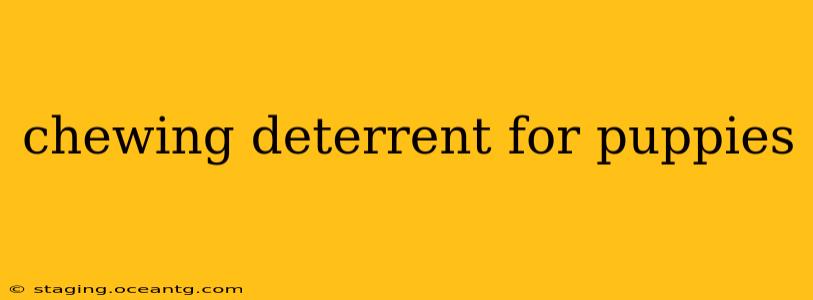Puppyhood is a time of boundless energy, playful exploration, and...destructive chewing. For new puppy owners, finding effective chewing deterrents is a top priority. This comprehensive guide explores various options, helping you choose the best approach for your furry friend. We'll address common concerns and offer expert advice to protect your belongings and keep your puppy safe.
What are the best chewing deterrents for puppies?
The "best" deterrent depends on your puppy's personality, chewing habits, and your household environment. There's no one-size-fits-all solution. However, several effective options exist:
-
Bitter Apple Sprays: These sprays utilize a naturally bitter taste that most puppies find unpleasant. Applied to furniture, shoes, and other tempting items, they can deter chewing. However, some puppies are undeterred, and the taste might wear off over time.
-
Taste Deterrents: Similar to bitter apple sprays, these come in various forms, including gels and sprays with different bitter-tasting ingredients. Some are specifically formulated to be safe if ingested. Always check the product label for safety information.
-
Puppy-Safe Chews: Providing an ample supply of appropriate chew toys can redirect your puppy's chewing instincts. Choose durable toys made from materials designed to withstand vigorous chewing. Rotate toys regularly to maintain interest. Consider offering a variety of textures and sizes.
-
Training and Positive Reinforcement: This is arguably the most effective long-term solution. Train your puppy to chew only on approved toys using positive reinforcement techniques. Reward good behavior with treats and praise. Redirect chewing behavior immediately when it's directed at inappropriate items.
-
Physical Barriers: For especially valuable or vulnerable items, physical barriers might be necessary. Consider using baby gates to restrict access to certain areas, or covering furniture with protective covers.
Are there any home remedies for puppy chewing?
Several home remedies are touted as chewing deterrents, but their effectiveness varies greatly. These options require careful consideration and should never replace professional veterinary advice:
-
Citrus Scents: Some owners report success using citrus peels or citrus-scented sprays. However, citrus oils can be toxic to dogs if ingested, so this method requires extreme caution and close supervision.
-
Vinegar: The strong smell of vinegar might deter some puppies. Dilute white vinegar with water and apply it sparingly to surfaces. Again, ensure it's thoroughly dried and not accessible for ingestion.
-
Pepper: Similarly, the spicy scent of pepper might be off-putting. However, like citrus, this should be used with extreme caution, as ingestion could irritate the puppy's sensitive digestive system.
What if my puppy keeps chewing despite using deterrents?
If your puppy continues to chew despite using deterrents, it's essential to consult a veterinarian or a certified professional dog trainer. Persistent chewing could indicate underlying issues such as:
-
Teething Pain: Puppies experience discomfort during teething, leading to increased chewing. Your vet can offer advice on managing teething pain.
-
Boredom or Lack of Exercise: Insufficient mental and physical stimulation can result in destructive chewing. Ensure your puppy gets enough playtime, training, and opportunities for exploration.
-
Separation Anxiety: Anxiety can manifest as destructive behavior. A vet or trainer can help you address any separation anxiety concerns.
-
Medical Conditions: In rare cases, excessive chewing could be a symptom of a medical condition. A veterinary checkup can rule out any underlying health problems.
How can I prevent my puppy from chewing on furniture?
Preventing furniture chewing requires a multi-pronged approach:
-
Choose puppy-proof furniture: Opt for furniture made from durable materials that can withstand chewing.
-
Cover furniture: Use protective covers or blankets to shield furniture from damage.
-
Provide alternative chews: Offer an abundance of appropriate chew toys to redirect chewing behavior.
-
Supervise your puppy: Close supervision is crucial, especially during unsupervised playtime.
-
Use deterrents: Apply bitter sprays or other deterrents to furniture to discourage chewing.
-
Train your puppy: Positive reinforcement training is crucial in teaching your puppy what is acceptable to chew on.
What are some good chew toys for puppies?
Choosing appropriate chew toys is vital. Look for toys that are:
-
Durable: Made from sturdy, non-toxic materials.
-
Appropriate size: Large enough to prevent swallowing but not so large that they become hazardous.
-
Engaging: Offer a variety of textures, shapes, and functions to keep your puppy entertained.
-
Safe: Free from small parts that could be choking hazards.
By understanding your puppy's chewing behavior and implementing a combination of strategies, you can create a safe and harmonious environment while guiding your puppy toward responsible chewing habits. Remember that patience and consistency are key!
